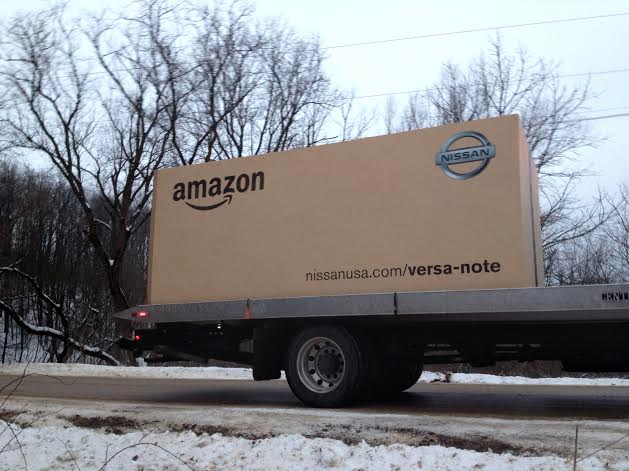Secure your place at the Digiday Publishing Summit in Vail, March 23-25

This post was written by Kellye Lopez of the Zocalo Group, on behalf of Nissan.
There’s no denying that the number of consumers making purchases online continues to increase, in part due to the seemingly limitless availability of products and convenience of having orders delivered to your doorstep. Almost anything that could once only be bought at a brick-and-mortar store can now be purchased with the click of a button – from prescriptions, to groceries, to … live lady bugs? Yes, those too. Pioneering this new wave of commerce is the online bookstore-turned-everything store, Amazon.com.
Regardless of industry, it seems almost every product is available from Amazon. This vast inventory has drawn consumers to the retailer in droves. The rise of e-commerce and changing purchase behavior has forced brands to find new and innovative ways to reach their customers. Instead of simply displaying products on their own website or hoping consumers discover them on a traditional retailer’s website, brands are looking to create unique shopping experiences for consumers and bring them to the virtual “stores” at which they’re already shopping.
Constantly looking for ways to add more products to its selection and improve the customer experience, Amazon has worked with a number of brands to create advertising campaigns that help customers engage with their products. “Often through ‘firsts,’ we look to engage consumers in new and innovative ways across our entire e-commerce platform,” said Seth Dallaire, Vice President of North American Ad Sales for Amazon Media Group. “From Amazon.com and our owned-and-operated websites, to Kindle devices and mobile apps, to AmazonFresh delivery trucks and Amazon Lockers.”
These programs have presented opportunities for a wide variety of brands to increase their visibility on Amazon, including some surprising big-ticket products that Amazon doesn’t actually sell.
Few purchase experiences are more involved than choosing a new car. However, over the past two decades, the car buying process has gradually evolved from visiting multiple dealerships to test drive, compare models and research prices, to visiting a single dealer, armed with enough information to make a purchase on the spot, based on research from digital and social channels, including recommendations from close friends and family members. With so many consumers making purchase decisions before ever stepping foot in a dealership, is the automotive industry also heading towards e-commerce? It might already be well on its way.
Shortly after Nissan’s all-new Versa Note arrived in dealerships in the summer of 2013, the company partnered with Amazon to change the way consumers think about purchasing a car.
“The idea was born out of a simple insight – owning a Versa Note allows drivers to do more of what they love. We noticed that hatchback owners love to keep all their gear – music instruments, workout equipment, crafts and the likes – in their car so they can do the things they love at a moment’s notice. Similarly, as the largest online retailer, Amazon is the one place where you can buy all the things you love, regardless of your passion,” said Michael Awdish, Senior Manager of Interactive Marketing at Nissan North America.
Nissan worked with Amazon to create an innovative new car-shopping experience, consistent with the look and feel of the Amazon site. Users were directed to the Versa Note’s custom Amazon product page that offered details on all of the car’s features. Here, shoppers were able to enter their contact information and be matched with a Nissan dealer in their area to complete the transaction. Nissan even selected one new owner to have their new Versa Note delivered to them in a larger-than-life Amazon box.
The overall success and buzz of the Versa Note campaign even surprised Nissan. It took only three days to generate as many leads as they originally predicted would take three weeks, and those leads from Amazon converted into sales at a much higher rate than those from more conventional marketing channels.
“The Versa Note program is a great example of how we can work to help customers find and discover more products on Amazon – even those we don’t sell – leveraging our e-commerce platform to help Nissan engage with customers in a new way. Nissan and their agencies OMD and TBWA\Chiat share our passion for innovation and obsession with creating great customer experiences, and we think the final product and results reflect that (as does, of course, their delivery of a Versa Note in a giant Amazon box),” said Dallaire.
The Versa Note effort with Amazon was so successful that a similar program is underway for the all-new Nissan Rogue. This time, the initial Rogue product page on Amazon was live for less than 24 hours before hitting the maximum number of reservations for the campaign.
It’s clear that e-commerce will continue to play a larger role in the future of the automotive industry. Whether it’s through simple shopping experiences, like the opportunity to reserve a Nissan Versa Note on Amazon, or more easy-to-use car “configurators” and simulation tools on manufacturers’ websites, major changes in the way people shop for cars are ahead. It will be those manufacturers and dealerships that embrace the transition to digital storefronts who will be best positioned to capitalize on this shift.
More from Digiday

WTF is Meta’s Manus tool?
Meta added a new agentic AI tool to its Ads Manager in February. Buyers have been cautiously probing its potential use cases.

Agencies grapple with economics of a new marketing currency: the AI token
Token costs pose questions for under-pressure agency pricing models. Are they a line item, a cost center — or an opportunity?

From Boll & Branch to Bogg, brands battle a surge of AI-driven return fraud
Retailers say fraudsters are increasingly using AI tools to generate fake damage photos, receipts and documentation to claim refunds.





